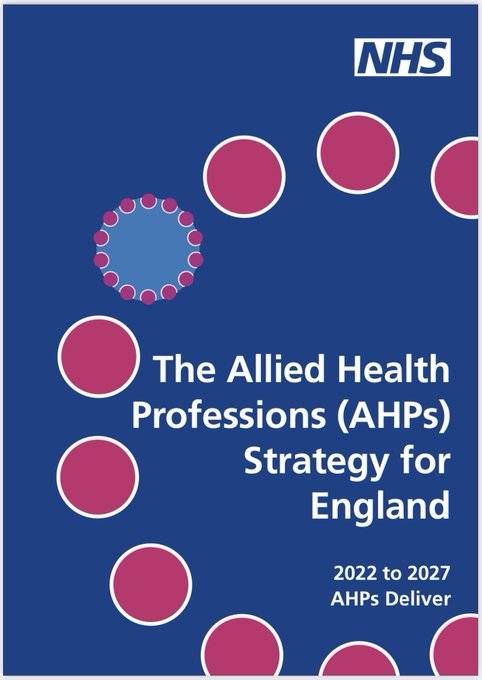Chief AHPs officer Suzanne Rastrick says five-year AHP strategy will act as a 'catalyst for change'
Suzanne Rastrick, the chief allied health professions (AHPs) officer for England, expressed her ‘pride’ via Twitter earlier today (21 June) in launching a five-year strategy for physiotherapy and the 13 other AHP professions. The gestation of the strategy, the latest in a series, was 'paused' in 2020 due to the impact of the Covid-19 pandemic but resumed in early 2021.
In a foreword to 39-page AHP Strategy for England: AHPs Deliver, Ms Rastrick stresses that it ‘captures the voices of diverse people and communities’. ‘This is intentional: they are central to everything the AHP community plans and delivers, and we continued our co-production commitment through to the final drafting of the strategy.'
This strategy is a catalyst for change. Wherever you work, every member of our AHP community has a part in realising our collective ambitions through its delivery [Suzanne Rastrick]
Ms Rastrick says the strategy was written using a ‘crowdsourcing’ approach to gain ‘collective insight’ and that groups who might have been digitally excluded contributed through ‘focused activities’.
Thanking everyone who played a part, Ms Rastrick continues: ‘This strategy is a catalyst for change. Wherever you work, every member of our AHP community has a part in realising our collective ambitions through its delivery.
Ms Rastrick adds: ‘I therefore encourage you to take a moment to consider how the AHP community can enable the change required to deliver future care today.’
AHPs 'work across the spectrum'
The strategy points out that, collectively, AHPs represent the third largest clinical workforce in the NHS. The 185,000 AHPs work ‘across the spectrum’ in health and care, education (including early years), academia, research, criminal justice system, voluntary and private sectors, it says.
‘From prevention to specialist care provision, AHPs deliver care to individuals, groups and, in some cases, specific populations of children and older adults.'
Aimed at the 'whole AHP community'
The strategy is for the 'whole AHP community': support workers, assistant practitioners, registered professionals, pre-registration apprentices and students. 'It is inclusive and reflects how AHPs work in multidisciplinary teams, so that those who identify as part of the AHP community working in a variety of health and care sectors can use it to continually improve and redesign services.’
The team that developed the strategy received 21,000 contributions from a diverse range of sources, including from AHPs, health and care and care staff, service users and carers. The strategy is leavened with pithy quotations from those who contributed.
The ambitions for the AHP community set out in the strategy are as follows
- raising awareness of AHPs: For care to be personalised, and for people to be able to make choices on how their needs can be best supported, people and communities need to know who the AHP community are. This includes understanding the expertise the 14 professions collectively provide, alongside the unique skills of each one.
- caring for those who care: As we emerge from the Covid-19 pandemic, ensuring the health and wellbeing of the AHP community will be critical for the months and years ahead. Learning from the pandemic, as individuals, organisations and systems, will drive improvement in staff experience. Staff wellbeing links to feeling valued and belonging and can be enhanced with flexible work options to support work/life balance. It is also important to identify AHPs who act as carers and support them accordingly.
- equality, diversity, inclusion and belonging: A sense of belonging ensures people bring their very best to work and provide the best for those they care for. There is a clear ethical, moral, and social case for equality, diversity, inclusion and belonging. Where standards are in place these will be used to monitor progress. Where standards do not exist, we will work to better understand the needs of these groups.
The strategy has four sections
The strategy principles of anti-racism and co-production. This strategy makes an overarching commitment that the AHP community will be anti-discriminatory and anti-racist in its approaches, using co-production to ensure actions are inclusive.
Reflecting on the achievements of AHPs into Action. Through our wide engagement we know AHPs into Action has had impact – many of the transformations it has achieved are now considered to be business as usual; others have scope for further growth.
Four enhanced foundations. The four priorities – described as ‘enhanced foundations’ – remain the same as in the first strategy but they have been further refined and are supported by updated frameworks and policies.
Five areas of focus. Five ‘areas of focus’ were identified for the next five years, each complemented by a set of ambitions. These are people first; optimising care; social justice: addressing health and care inequalities; environmental sustainability; strengthening and promoting the AHP community.
The 14 AHP professions are as follows
art therapists; dietitians; dramatherapists
music therapists; occupational therapists; operating department practitioners
orthoptists; osteopaths; paramedics
physiotherapists; podiatrists; prosthetists and orthotists
diagnostic and therapeutic radiographers; speech and language therapists
To see the strategy in full, visit: https://www.england.nhs.uk/wp-content/uploads/2022/06/allied-health-professions-strategy-for-england-ahps-deliver.pdf
Author: Ian A McMillan
Share it with















